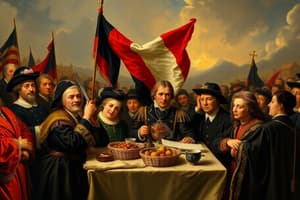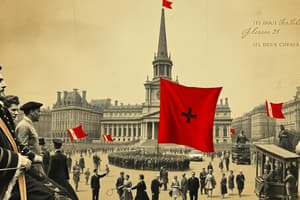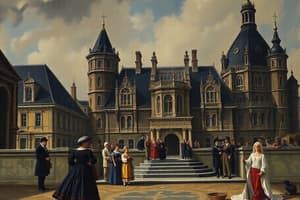Podcast
Questions and Answers
How was the French society divided into different estates in the 18th century?
How was the French society divided into different estates in the 18th century?
The French society was divided into three estates in the 18th century: the clergy (1st estate), the nobility (2nd estate), and the commoners (3rd estate).
What were the main reasons for the empty treasure when the King became the ruler?
What were the main reasons for the empty treasure when the King became the ruler?
The main reasons for the empty treasure when the King became the ruler were the long years of war and the maintenance of the court of the Palace of Versailles.
Describe the privileges and power held by the clergy (1st estate) in French society.
Describe the privileges and power held by the clergy (1st estate) in French society.
The clergy, which included priests, bishops, and other religious leaders, were part of the church and held a lot of power and influence. They were also exempted from paying taxes.
What was the role and status of the nobility (2nd estate) in French society?
What was the role and status of the nobility (2nd estate) in French society?
Why was the measure of increasing taxes not sufficient to meet the expenses of the French government?
Why was the measure of increasing taxes not sufficient to meet the expenses of the French government?
How did the French government's involvement in the American War of Independence contribute to the financial problems faced by the French state?
How did the French government's involvement in the American War of Independence contribute to the financial problems faced by the French state?
What were the feudal dues extracted from the peasants in the Old Regime France?
What were the feudal dues extracted from the peasants in the Old Regime France?
What was the burden faced by the Third Estate alone in financing the state?
What was the burden faced by the Third Estate alone in financing the state?
What percentage of the population in France was made up of peasants, and how much land did they own?
What percentage of the population in France was made up of peasants, and how much land did they own?
What factors led to the subsistence crisis or frequent food shortages in Old Regime France?
What factors led to the subsistence crisis or frequent food shortages in Old Regime France?
How did the growing middle class challenge the privileges of birth in eighteenth-century France?
How did the growing middle class challenge the privileges of birth in eighteenth-century France?
What were the sources of wealth for the growing middle class in eighteenth-century France?
What were the sources of wealth for the growing middle class in eighteenth-century France?
What were the three estates in pre-revolutionary France, and how were they represented in the Estates General?
What were the three estates in pre-revolutionary France, and how were they represented in the Estates General?
What was the key demand of the Third Estate regarding voting in the Estates General, and how did the King respond?
What was the key demand of the Third Estate regarding voting in the Estates General, and how did the King respond?
Describe the events that led to the formation of the National Assembly by the Third Estate.
Describe the events that led to the formation of the National Assembly by the Third Estate.
How did the ideas of philosophers spread among the people in pre-revolutionary France?
How did the ideas of philosophers spread among the people in pre-revolutionary France?
What was the reaction of the people to the news that King Louis XVI planned to impose further taxes?
What was the reaction of the people to the news that King Louis XVI planned to impose further taxes?
How did the rise of the middle class in the eighteenth century contribute to the outbreak of the French Revolution?
How did the rise of the middle class in the eighteenth century contribute to the outbreak of the French Revolution?
Flashcards are hidden until you start studying
Study Notes
French Society in the 18th Century
- French society was divided into three estates: the clergy (1st estate), the nobility (2nd estate), and the commoners (3rd estate)
Estates and Their Privileges
1st Estate: Clergy
- Held significant power and privilege
- Controlled vast landholdings and wealth
- Exempt from taxes and enjoyed immunity from civil law
- Had a significant role in governing and advising the king
2nd Estate: Nobility
- Held high social status and wealth
- Enjoyed privileges such as exemption from taxes and hunting rights
- Held important positions in the government, army, and church
- Their status was based on birth and family lineage
Financial Problems of the French Government
- The French government faced financial problems due to:
- Empty treasury when the King became the ruler
- Increasing taxes, which were not sufficient to meet expenses
- Involvement in the American War of Independence
- French government's financial problems led to a subsistence crisis and frequent food shortages
Burden on the Third Estate
- The Third Estate (commoners) alone bore the burden of financing the state
- Peasants, who made up around 80% of the population, owned around 40% of the land
- They paid feudal dues, such as tithes, rente, and corvée, to the nobility and clergy
Factors Leading to the French Revolution
- Growing middle class challenged the privileges of birth
- Middle class wealth came from:
- Trade and commerce
- Industry and manufacturing
- Financial investments
- The rise of the middle class contributed to the outbreak of the French Revolution
Estates General and the National Assembly
- The three estates were represented in the Estates General
- Key demand of the Third Estate was voting by head, not by estate
- King Louis XVI refused to grant this demand, leading to the formation of the National Assembly by the Third Estate
Spread of Enlightenment Ideas
- Philosophers' ideas spread through:
- Salons and coffeehouses
- Pamphlets and publications
- Conversation and debate
- These ideas contributed to the growing discontent among the Third Estate and the eventual outbreak of the French Revolution
Studying That Suits You
Use AI to generate personalized quizzes and flashcards to suit your learning preferences.




